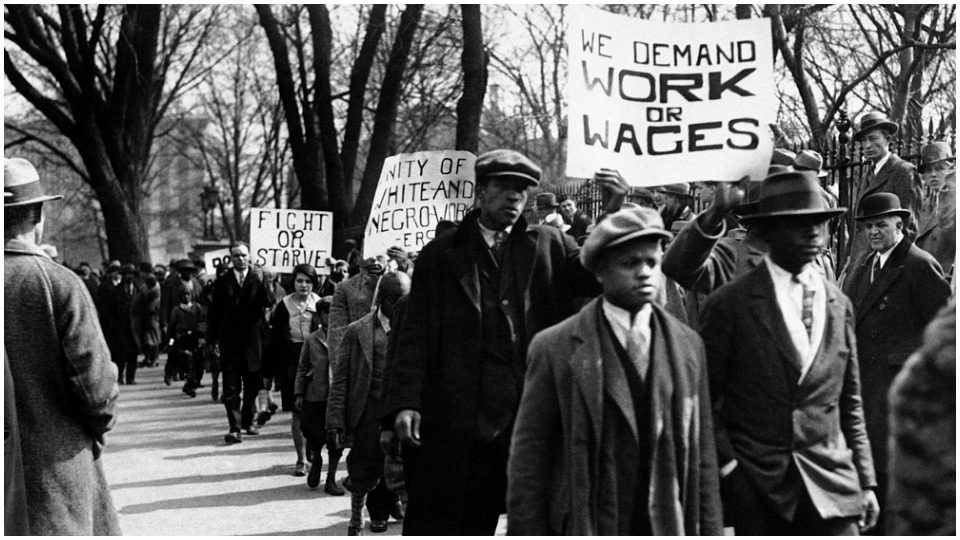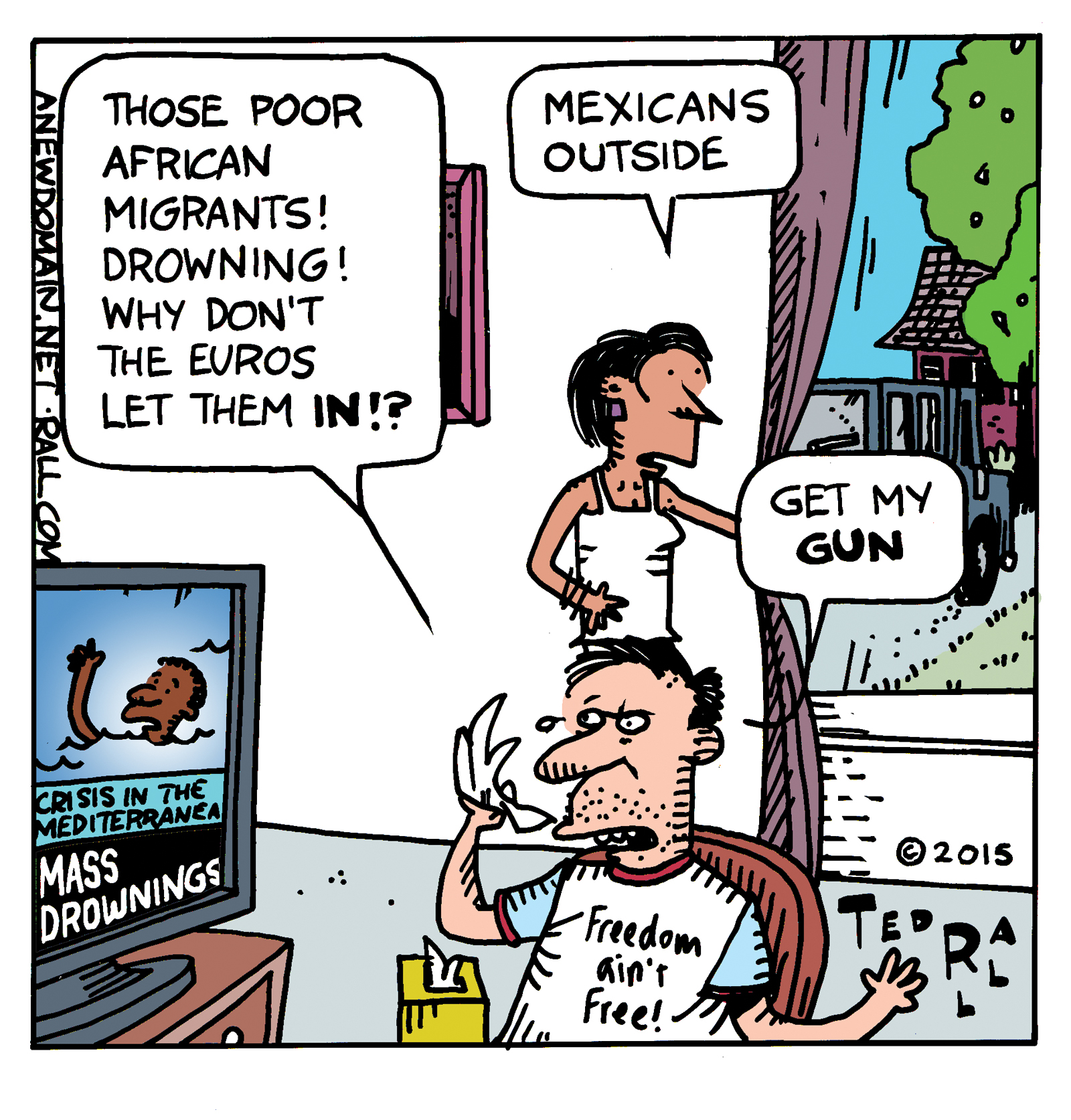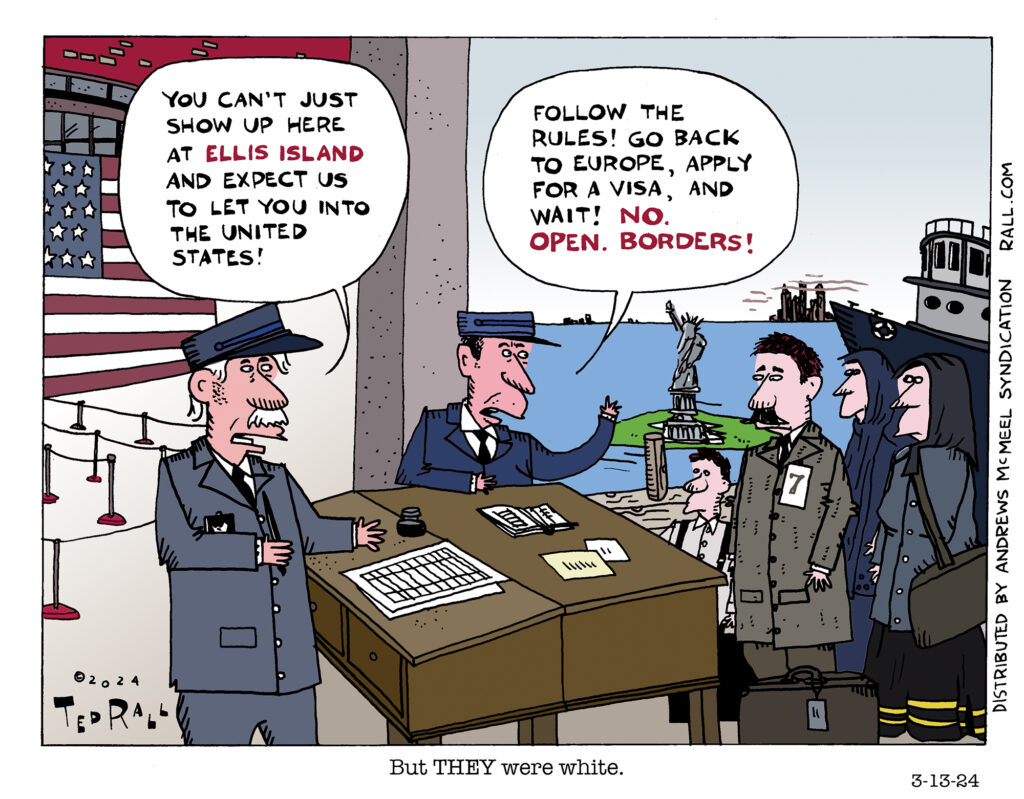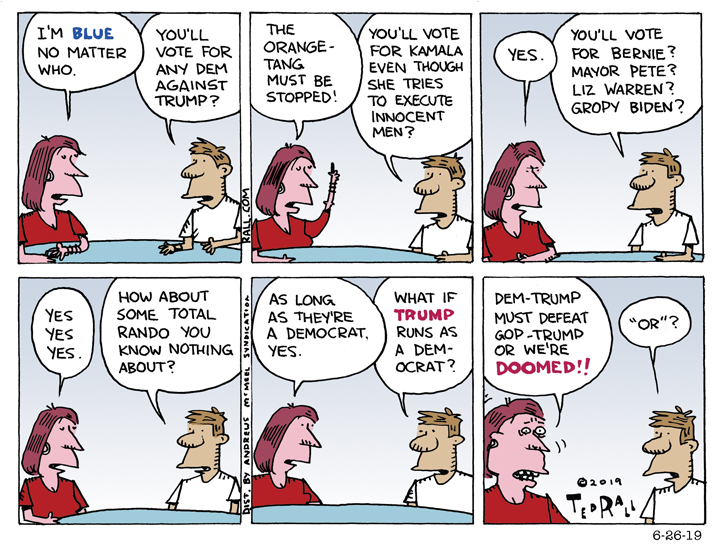Democrats’ idea of “resistance” to Trump is considerably less substantial than actual resistance to fascism looked like during World War II. And it probably shouldn’t have started with a unanimous vote for neoconservative maniac Marco Rubio.
TMI Show Ep 85: Germany’s Politics Move Right. What Could Go Wrong?
Live at 10 am Eastern/9 am Central time, and Streaming 24-7 Thereafter:
When German politics shift to the Right, the world gets nervous. German’s Alternative for Germany (AfD) Party came in second in parliamentary elections, largely on the strength of German anger over the economy and anti-migration nativist sentiment. Has AfD peaked out? Does this presage results in France and other European countries? How should we feel and respond to the right of the German Right?
On today’s episode of “The TMI Show,” Ted Rall and Manila Chan discuss the AfD’s victory in Germany.
TMI Show Ep 74: War Against Greenland
Live at 10 am Eastern/9 am Central time, and Streaming 24-7 Thereafter:
Professor Kristian Nielsen of Aarhus University in Denmark joins “The TMI Show” to discuss the possibility of a US invasion of Greenland. Setting up a confrontation with NATO, Donald Trump says the Danish territory—where the US has a Space Force base already—is essential to American national security. It also has rare earth minerals and an opening to new Northwest Passage that has been created by climate change and the melting of the Polar Ice Cap.
What are the possibilities of an American war against Greenland? What’s the status of the American nuclear facility there? Why has the polar north become strategically important? Ted Rall and Manila Chan give you Too Much Information about the great white north.
The TMI Show Ep 28: “Turkey’s Perspective on Trump, NATO, Ukraine”
 By dint of geography, history, culture and human evolution, Turkey is one of the most influential nations in the world and certainly that’s the case throughout Asia. The trade and cultural gateway between Europe and Asia, Turkey has recently taken a light authoritarian and nationalist turn under the presidency of Reyup Erdogan, who has been serving as president for the last decade.
By dint of geography, history, culture and human evolution, Turkey is one of the most influential nations in the world and certainly that’s the case throughout Asia. The trade and cultural gateway between Europe and Asia, Turkey has recently taken a light authoritarian and nationalist turn under the presidency of Reyup Erdogan, who has been serving as president for the last decade.
As Donald Trump prepares to return to the American presidency, there has been speculation that Erdogan’s natural stylistic affinity to Trump may draw him closer to the United States as Turkey — like all countries between great powers — balances the US and its European allies against Russia and perhaps even plays them off against each other. On the other hand, Russia has gained the upper hand in Ukraine. And Trump seems to want to end the Russo-Ukrainian War. Then there’s the country’s complicated relationship with Europe: it’s been a member of NATO since 1995 but its application to join the EU has stalled since Erdogan became president.
Dr. Hasan Ünal, professor at Baskent University in Ankara, has published extensively on Turkish foreign policy-related matters. He joins TMI Show hosts Ted Rall and Manila Chan to explore Turkey’s dilemma: East or West? Which to Choose?
DMZ America Podcast #150: Lawfare v. Hunter Biden, Age v. Joe Biden, EU Elections
Political artists Ted Rall (on the Left) and Scott Stantis (on the Right) aren’t just smart prescient analysts of news and current events. They are also best friends. So they’re not going to yell each other and try to talk over each other. They discuss and debate with courage and respect, making for easy-to-listen-to political discussion.
This week, the Wall Street Journal reports that Democratic and Republican White House insiders are all worried about the mental and physical fitness of the President of the United States. Biden nods off during meetings, doesn’t seem to know how to read the room, doesn’t seem to understand much about what’s going on. What can and should be done about this terrifying situation?
Also, Hunter Biden becomes the latest political figure targeted by a “gotcha lawsuit,” in which a relatively trivial offense is blown up into a major legal problem not because society must be protected from a villain but because it might score a few political points. Scott and Ted compare and contrast this trial over gun charges in Delaware with the conviction of former President Donald Trump in his hush money trial in New York.
Finally, elections in the European Union seem to indicate that the right wing parties are more likely to pick up seats than their rivals. Ted is authorized to vote in French elections and has received a bunch of propaganda from a myriad of political parties running candidates. Why can’t the United States have as much choice as France? Part of the answer lies in our stupid constitution.
Watch the Video Version: here.
Follow the Rules, Like Immigrants Used To
Nativists and xenophobes appalled by the “open border” policy that has allowed millions of asylum seekers to enter the United States often harken to a nonexistent history when immigrants followed the rules and waited to be invited before entering the U.S. However, Ellis Island was exactly like Eagle Pass, Texas today; German, Irish, Italian and other immigrants were allowed in en masse, without visas, and became the great-grandparents of the vast majority of citizens today.
Here’s What a Progressive Platform Looks Like

“Be realistic. Demand the impossible.” —Situationist slogan, 1968.
Demand #1: The $30-per-hour Minimum Wage.
Not phased in over so many years that today’s $30 is worth $20 by the time it takes effect. $30 an hour for all workers, no exceptions, now. This is an eminently reasonable demand. If anything, it’s too little to ask. $7.25 is a sick joke. Congress’ abdication of its moral duty to reward American workers for their extraordinary productivity by increasing the minimum wage at or faster than inflation has eroded the base salary since the Vietnam era. Corporate profits have soared as workers’ wages have stagnated.
The federal minimum wage was $1.60 in 1968. Adjusting for the official inflation rate, that’s $30.00 today. Let’s party like it’s 1968.
Demand #2: Free national healthcare.
Not market-based, not a hybrid—we need real, actual, universal healthcare. Every nurse and every doctor becomes a federal employee. Health insurance vanishes as a business sector. Every check-up, every test, every doctor’s visit, every medication, every surgical procedure is fully covered, no questions asked, as long as it’s approved by a physician.
This is not too much to ask. Germany, where only 0.5% of the population is uninsured, pays only 10.7% of GDP for healthcare, compared to 16% here in the U.S. Norway, where hospitals are operated by the government, has a $210 per citizen per year deductible after which the government picks up the tab for everything; like Germany, overall healthcare costs in Norway are about 60% of ours.
Throw in dental, vision and mental health.
Demand #3: Slash military spending by 80%.
We’re not the world’s policeman. We’re its deranged serial killer. The U.S. squanders $800 billion a year to invade, occupy, assassinate, intimidate and bomb people who mean us no harm and destroy their infrastructure. That’s more than the next nine biggest-spending militarist nations combined. And those countries total 10 times our population.
Slashing the Pentagon budget would make the world safer. Fewer U.S. wars and proxy wars would reduce anti-Americanism and thus reduce the chance of another terrorist attack, save thousands of American lives and millions of people overseas, not to mention massively helping out the environment.
Those savings would easily cover…
Demand #4: Free four-year college.
Young Americans have long been coerced into a devil’s bargain: without a college degree, they’ve been told, you won’t land a decent-paying job. College is insanely expensive so you’ll have to accept the burden of student loan debt. If you don’t make enough money after graduation due to bad luck or a bad economy or a changing workplace, too bad, you still have to pay. You can’t even discharge the loans in bankruptcy.
If the corporations who own our politicians require job applicants to have a college degree, a college degree should be free. 39 countries have free college. We deserve, and can afford, the same as Kenya, Iceland and Panama.
Demand #5: Leadership to ban the most frightening weapons.
As the world’s most aggressive militaristic nation and its biggest international arms dealer, only the U.S. has the standing and power to stop the arms races we’re starting. The U.S. should forswear its currently-stated, insane option of launching a nuclear first strike and invite all other nuclear powers to make the same commitment. It should join the 80% of the world’s nations that have pledged not to use landmines. It should ban drone-based weapons in its military, police and civilian sectors and demand that other nations do the same. The world must come together to ban lethal autonomous weapons; the U.S.’ early lead in this technology gives it leverage to lead the way.
More to come.
(Ted Rall (Twitter: @tedrall), the political cartoonist, columnist and graphic novelist, co-hosts the left-vs-right DMZ America podcast with fellow cartoonist Scott Stantis. You can support Ted’s hard-hitting political cartoons and columns and see his work first by sponsoring his work on Patreon.)
SYNDICATED COLUMN: Bernie Sanders is a Socialist and So Are You
 When it comes to politics, Americans are idiots.
When it comes to politics, Americans are idiots.
Because American voters are political ignoramuses, Bernie Sanders found it necessary to take the stage at Georgetown University yesterday to explain what socialism, and democratic socialism are. The point being that too many Democratic primary voters plan to cast their ballots for Hillary Clinton, not because they like her or her ideas, but worry that a self-declared socialist (or democratic socialist) won’t be able to beat the Republican nominee in the general election.
Setting aside the rather idiotic idea of voting for a candidate because everyone else is voting for her — what’s the point of holding an election? we’d might as well turn elected office over to the candidate with an early lead in the polls — I have to wonder whether an electorate that knows nothing about socialism is qualified to vote at all.
And remember: these are Democratic primary voters. One must shiver in fear at the colossal dumbness on the Republican right, where climate change denialism is normative, Ronald Reagan was brilliant (and brought down This Wall) and Tea Party marchers famously carry signs demanding “government get out of my Medicaid.” To them, socialism means Stalin — if they know who he was.
Socialism, Marx and Engels explained, is the long transitional economic form between laissez faire capitalism and communism, an ideal utopian state that will only become possible after the rise of a New Man (and Woman) whose total commitment to communitarian ideals over individualistic concerns allows the state to wither away and people to rule themselves in small collectives. This true ideal communism, Marxists believe, is centuries away at best.
In contemporary politics, Communist Party rule in nations like the Soviet Union and China led to confusion, especially in the West, where capitalist news media was only too happy to turn a relatively simple idea into a muddle. Neither the Soviet nor the Chinese Communist Parties ever claimed to have achieved communism. With the exception of Pol Pot’s bizarre Kampuchea, communist parties governed self-declared socialist states, not communist ones. It was, after all, the Union of Soviet Socialist Republics.
When Bernie Sanders calls himself a socialist, he’s drawing upon a tradition of Western European electoral politics in which socialist principles live alongside free-market capitalist ones, rather than a fully fleshed-out transformation of the economy into one in which the workers control the means of production. For Sanders and the hundreds of millions of citizens of the nations of Europe and their post-colonial progeny (Canada, Australia, many African countries), democratic socialism is a system that looks a lot like the United States of America.
In the ur-democratic socialist nations of Norway, Denmark and Sweden, citizens’ elected representatives propose and vote on laws — just like here.
There is no state economy. There are, like here, small private businesses and giant corporations.
So what makes them socialist? Government regulations and the social safety net. Government agencies tell power companies, for example, how much they may pollute the air and sets the minimum wage. There is, as in all capitalist societies, poverty. But the government mitigates its effects. Welfare and unemployment benefits, social security for retirees, free or subsidized healthcare make things easier when times are tough.
The United States is a democratic socialist country, albeit a lame one.
Senator Sanders wants less lameness.
In his speech, The New York Times summarized, “he said he wanted an America where people could work 40 hours a week and not live in poverty, and that such a society would require new government entitlements like free public colleges, Medicare-for-all health insurance, a $15 minimum wage, $1 trillion in public works projects to create jobs, and mandatory [paid] parental leave.”
These benefits are standard in almost every other technologically advanced nation on earth, as well as many developing countries. Democratic socialism? It’s like that old dishwashing liquid ad: you’re soaking in it.
Yet here is Sanders, in what pundits are calling a do-or-die speech attempting to fix his “I like him but America won’t elect a socialist” crisis. David Axelrod, who worked on Obama’s 2008 campaign, says, “The issue here is, is that word [socialism] a barrier for a sufficient number of voters that it creates an electoral ceiling for him?”
As far as I know, Bernie hasn’t emphasized the quality of public education in his campaign. But something is, no pun intended, radically wrong when so few Americans understand basic political and economic terms — especially when they apply to the political and economic system under which they themselves live.
By global standards, Sanders’ campaign is calling for weak socialist tea. In most European countries, all colleges are free or charge nominal fees. Socialized medicine, in which your doctor is a government employee and there’s no such thing as a big for-profit hospital corporation, is the international norm. Paid leave? Obviously. And most governments recognize the importance of public infrastructure, and not relying on the private sector to provide every job.
There can only be one reason Americans don’t know this stuff: they’re idiots. Their schools made them that way as kids. Media propaganda keeps them stupid as adults.
(Ted Rall, syndicated writer and the cartoonist for ANewDomain.net, is the author of the new book “Snowden,” the biography of the NSA whistleblower. Want to support independent journalism? You can subscribe to Ted Rall at Beacon.)
COPYRIGHT 2015 TED RALL, DISTRIBUTED BY CREATORS.COM
African vs Mexican Immigrants: Get My Gun
Originally published by ANewDomain.net:
Americans are sympathetic to the plight of African immigrants drowning while trying to enter Europe, but they seem to care a whole lot less when the “illegal immigrants” are Mexican immigrants coming into the United States.




